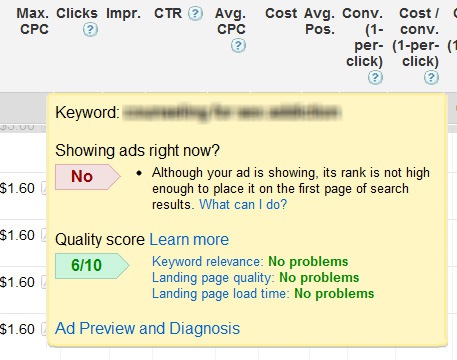You know Google’s got this “quality score” (QS) thing – and you know it matters. It matters because AdWords uses this 1 to 10 scale to rate how good and relevant your ad is compared to others, and the more relevant AdWords thinks your ad is, the more it’ll get shown and the less you’ll get charged for each click.
First, let’s quickly review…
What factors into the quality score calculation
- Clickthrough rate (CTR)
- Ad history
- Landing page relevance
- Landing page speed
This is a simplistic view; in reality, there are lots of factors that influence the quality score calculation and you can read more about them in this more comprehensive post.
What’s most critical is this: CTR is the single biggest determinant of QS. If you have fantastic CTR – assuming you landing page loads normally – you’ll usually have great QS.
How to improve quality score
Here’s a quick guide to get you started.
- Separate the good from the bad. Start with the hatchet, and then we’ll use the scalpel. Set up a filter using AdWords Editor for all keywords with QS < 7. Cut all of those keywords and put them in a separate campaign(s).
The traditional school of thought around QS is that, although it’s only reported in the AdWords interface at the keyword-level, there’s actually adgroup-level and campaign-level QS too. The higher the overall QS of your adgroups and campaigns, the better.
You also want to isolate the QS < 7 keywords in order to troubleshoot them.
- Figure out why the QS is poor. Bad QS indicates poor relevance. Luckily, Google helps you troubleshoot this, at least in broad strokes, if you mouse over the little speech bubble in the “Status” column when looking at the “Keywords” view.

It can also be useful to try the diagnostic tool (the “Ad Preview and Diagnosis” link shown above). In the case above, though, there are no clear issues with the QS. It’s just that the keyword / ad combo isn’t all that fantastic when compared against others for this search term. The thing to do in this case is, well, see point “a” below.
Here are a few common reasons your QS sucks:
- Your keywords need to be tightly related to the ads in your adgroup. If your keywords are thematically all over the place, your overall CTR will come down and impact QS.
- The destination page where you’re sending people who click your ad isn’t clearly relevant to the content of your ad. If your ad is for flowers, that landing page better be about flowers.
- Your ad copy doesn’t contain the words in the keyword phrase you’re bidding on. This comes back to having small, tightly thematic adgroups. Your ads need to say to users, “You searched for pretty red flowers, and I’m all about pretty red flowers.”
- Your landing page loads too slowly. It isn’t super common that your page loads so slowly that Google dings you with respect to quality score.
- This is a controversial one, but Google account teams have confirmed it to me in the past: you’re simply not bidding enough. If you’re in a competitive space and your bid is leaving you with a poor average position (5-8, let’s say), your position results in a poor CTR and that poor CTR impacts your QS. Harsh but true.
The only solution here is to create a single-keyword adgroups, A/B test ads that are super relevant, and raise your bid. If you achieve decent position and start to get that CTR up, developing some good CTR history will help you and can eventually make the term less expensive.
- Raise your CTR. Sounds easy enough. How?
-
- Make your ad copy laser-targeted. How to write good AdWords ad copy is a whole other beast, but at minimum, know that you need to say what you’re offering in the ad headline, match it to the specific words the user searched, repeat those words throughout the ad (but don’t overdo it – the ad needs to read like it makes sense or you’ll lose credibility), and capitalize the first letter of each word, excluding prepositions, conjunctions, etc.
- Try this exercise. Google one of your top keywords and take a look at what competitors’ ad copy focuses on. Check out the search I conducted below to buy herbal tea online.

What do you notice about each of the ads? The first one emphasizes health benefits. The second one touts a testimonial (I’m not sure who Sir Jason Winters is, but if I’m ignorant, just let me know in the comments). J The third promotes its tea as “award winning” and offers a coupon code. The fourth ad is all about low prices and free shipping.
Now, go into your own AdWords account and create 3 ads tied to a few of your highest-volume keywords. Make sure they’re related closely enough to share an adgroup. Focus each of the 3 ads on a completely different benefit. One can be price-oriented with a coupon code; another can talk about all the great press you’ve gotten on CNN and the BBC.
Measure their respective CTRs and get a sense for what your customers care about most. Then, kill the 2 underperformers and create 2 new ads focused on the winning benefit, using different wording. Test tweaks to description line 2, for instance. This is how you refine ad copy to lock down a great CTR and a solid quality score.
The bottom line
While there’s no one-size-fits-all QS solution, and no one knows exactly how the algorithm works, we do know you’re typically rewarded with good QS when you build strong account history with highly relevant ads that point to good landing pages.
If you adhere to guidelines from the “layman’s 30-minute SEM audit,” develop single-keyword adgroups and maximize traffic coming from exact match keywords – that often covers half the battle when it comes to quality score optimization.
Feel free to drop me a line if you have any questions.




